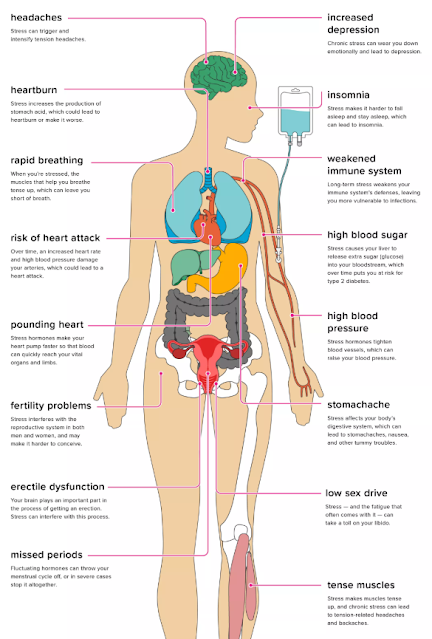 |
| Image source Google | Image by thenewsurgery |
Having difficulty in concentrating, feeling tired, or unable to memorize things. If you are facing these symptoms then it is possible that you are suffering from stress.
What is stress
Stress can be defined as the body reacting to a threat or any type of demand. In other words, the non-specific response of the organism to any pressure or demand.
It is estimated that about 77 % of people experience stress that affects their physical health.
Symptoms of stress
Fact according to 2020 data
- Irritability and anger: 45 %
- Fatigue or low energy: 41 %
- Lack of motivation or interest in things: 38 %
- Anxiety, nervousness, or worry: 36 %
- Headaches: 36 %
- Feeling sad or depressed: 34 %
- Indigestion, acid reflux, or upset stomach: 26 %
- Muscle tension: 23 %
- Appetite changes: 21 %
What causes stress
Whenever we are under any type of threat or in a difficult situation such as
- Running in a race. ( To win )
- Having problems in a relationship.
- Lost your job.
- Under workload.
- To survive any physical attack.
these are called stressors due to which we get stress for a shorter or longer amount of time. Now, stressors can vary from person to person, it is not necessary that one's person stressors should be the stressors of another person.
If any stressor converts into a normal situation then our stress level also gets reduced and will return back to normal. Our body will react in stressful condition using two responses i.e first response and second response
First response or Acute stress
Our first response is very immediate to any stressful situation and we began to take actions unconsciously because our brain activates our primitive flight or fight response and thus the first response is uncontrollable.
Our body will release Epinephrine and norepinephrine hormones through the Sympathetic Nervous System. These hormones will travel through our blood vessels and eventually will get reach to the heart.
 |
| Image Source Google | Image by biologydictionary |
Let's consider an example, you are sitting on a bench in a beautiful garden looking at the stars in the sky. It was almost an hour while sitting and relaxing on a bench, so you decide to go back to home.
While stepping down, you saw a big snake crawling towards you. In this case, your heart will begin to beat faster because of hormones and to provide sufficient blood in every part of your body, your vision will become narrower in order to focus more and ignore all other distractions.
Your muscle will become tenser and your body will begin to produce more glucose in order to provide more energy.
Stress activates our first response as it is good for us to fight with any difficult situation or with any threat. Our first response is also called Acute stress.
This type of stress is not very dangerous to us rather than to some extent it is good because
- It is for a very shorter amount of time.
- It improves cognitive function.
- Increases our immune response.
Second response or Chronic stress
Our second response is not very immediate and therefore it can take from hours to years to make an effect on the body. The decisions taken by the second response is also unconsciously.
If you are facing stress for a long time then your body will behave differently unlike in the case of Acute stress and eventually it becomes chronic stress.
In chronic stress, your body will work through the HPA axis i.e Hypothalamus Pituitary Adrenal gland. Our brain has a part called the hypothalamus which releases the Corticotropin-releasing factor ( CRF) hormone which stimulates our pituitary gland, this gland is the mother of all hormones and will release Adrenocorticotropic hormone (ACTH). ACTH will activate the Adrenal gland which is situated at the top of the kidney and is the home of cortisol hormone.
This whole cascade works together and will release the final stress hormone i.e cortisol. Cortisol also does the same thing as adrenaline and noradrenaline, it will keep your heart rate elevated, glucose level to high, the digestive activity will get reduced, and furthermore.
Another thing is cortisol will start doing breakdown of fats to produce more energy. Cortisol will also increase arousal and focus.
Causes and effects of stress
 |
| Image source Google | Image by stress |
- It will decrease concentration, focus, and hippocampal activity.
- Decrease vaccination response, wound healing, resistance to infection.
- Increase the risk of anxiety, depression, PTSD, sleep disturbance.
- Eating poorly, driving recklessly, abusing alcohol or drugs, being accident-prone, showing aggression
- Reproductive issues
How to do stress management
- Deep breathing:- Taking a deep breath can reduce our stress to a very extent because we only focus on our breathe neglecting all the outside problems. While breathing our brain will send a message to the whole body to get relaxed and all your system will get relaxed which was active during stress.
- Exercise:- Doing any type of exercise, it may be walking, muscle workout, or dancing, is the best way to reduce stress. Our brain releases happy hormones like endorphins.
- Reduce your stimulants:- We should reduce taking stimulants such as caffeine, nicotine, or sugar. While in stress, stress hormones are circulating in our bloodstream and if we take stimulants, they will activate those hormones even more.
- Yoga:- Doing yoga you will get two components, you will get the benefits of doing exercise and deep breathing.
- Tai chi:- Tai Chi has slow and fast movement but primarily slow in the beginning to help people relax, train internal energy, sensitivity, and develop internal power. We use relaxed coiling spiral type movement to release tension and stiffness and improve relaxation and blood and energy flow.
- Transcendental meditation:-Those who practice transcendental meditation may experience a decrease in stress and anxiety within minutes. As with other forms of meditation, a long-term practice can lead to even more positive changes, including resilience to stress, lower overall anxiety, and even greater life satisfaction.
- Qigong:- According to the philosophy of traditional Chinese medicine, qigong exercise aims to achieve a harmonious flow of vital energy (qi) and regulate the functional activities of the body through regulated breathing, mindful concentration, and gentle movements. The present findings support that qigong has a positive effect on reducing stress and anxiety and enhancing body-mind well-being.


0 Comments